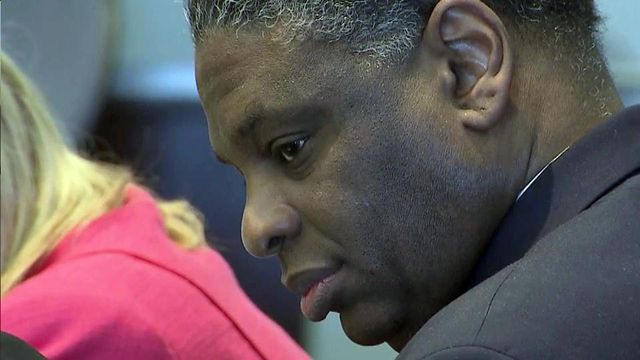Juror: 'Hands were tied' in 'sleepwalking murder' trial
One member of the jury that acquitted a Durham County man who said he wasn't aware he had killed his son more than four years ago because he was sleepwalking at the time said Thursday that she regrets the verdict but says jurors were left no choice.
Posted — UpdatedThe nine-woman, three-man jury deliberated less than four hours Wednesday before finding Joseph Anthony Mitchell not guilty of first-degree murder in the Sept. 22, 2010, strangulation death of 4-year-old Blake and of two counts of attempted first-degree murder in attacks on his older children, Alexis, who was 13 at the time, and Devon, who was 10, in their home that same night.
Mitchell, 50, testified last week that he was under tremendous stress because he had been unemployed for two years and the family's house was in foreclosure and that he had gotten little sleep in the weeks before Blake's death. A defense expert said the combination of stress and lack of sleep led to a case of "non-REM parasomnia," a sleep disorder where Mitchell could perform random acts unconsciously and could become violent if triggered by a loud noise.
The juror, who didn't want to be identified, said she was "embarrassed to be part of this" and wants to put the case behind her.
"I feel like I got dragged into someone else’s nightmare," she said. "You’re just there trying to do the best you can and follow the law and do your duty, and it’s not easy."
Mitchell never claimed that he didn't kill Blake, only that he didn't consciously do it. The juror said the law didn't leave them an option but acquittal because they found no intent or malice in Mitchell's actions.
About 90 minutes into their deliberations Wednesday, jurors asked if they could consider a manslaughter conviction, but Superior Court Judge James Roberson limited them to verdicts of guilty of first- or second-degree murder or not guilty.
"We would have definitely convicted him of manslaughter," the juror said. "We felt like our hands were tied.
"We came very close to a hung jury," she continued. "There were a lot of tears. A lot of people were very upset because we didn’t want to do what we felt we had to do, which was say he was innocent. It was mortifying to be part of it, but we all sworn to do our duty."
Durham County District Attorney Roger Echols said the facts of the case ruled out a manslaughter conviction.
"It’s a case that, if you believe Mr. Mitchell committed these acts consciously, there’s some level of malice and/or premeditation that comes with that," Echols said. "If you don’t believe he committed these acts consciously, then certainly it’s not what some people think of as a heat-of-passion killing, so therefore voluntarily manslaughter should not apply."
During the trial, defense attorney Jay Ferguson asked Roberson to allow jurors to consider an involuntary manslaughter conviction, saying there was evidence that Mitchell's negligence in not treating his stress and sleep problems led to the parasomnia. Roberson denied that request.
"If Mr. Mitchell committed these acts in a conscious state, it wasn’t involuntary, and if he committed them in an unconscious state, then the law says he or anyone else is not guilty of any crime they commit in an unconscious state," Echols said.
Still, the prosecutor said he was disappointed in the verdict.
"I don’t know exactly what the jury thought. They could have believed, for all I know, that he was sleepwalking or could have had reasonable doubt as to whether or not he was conscious at the time," he said.
The juror said that, although she and her fellow jurors didn't believe Mitchell, the defense simply did a better job of presenting its case.
"I don’t know if he was sleepwalking or not," the juror said of Mitchell. "I think he is a pathological liar. ... Everything he said was mostly discounted by us."
Ferguson said his biggest challenge in the case was getting jurors to even consider that Mitchell's version of events was true.
"I knew from the day I met Joe he was a different person," he said. "He was not one who would want to kill his kids. We would just have to find out why."
Mitchell declined to comment as he left the Durham County jail Wednesday night a free man for the first time in four and a half years. Ferguson said he is now trying to rebuild his life.
"For Joe, it's bittersweet. Obviously, he enjoys his freedom, but the irony of all this is what he really wants out of life is to be reunited with his family, and that's just not going to happen right now," Ferguson said.
Mitchell's wife, Christine Perolini, divorced him after Blake's death, and she was so distraught over his acquittal that she had to be taken out of the Durham County Courthouse on a stretcher.
Echols said he has tried to give Perolini some space.
"The family is obviously having a difficult time," he said. "Whichever verdict or whichever combination of verdicts was going to be difficult. This was probably, as people have seen, the most difficult scenario."
The juror said she feels that she let down Perolini and her family, but the jury had no choice.
"I knew she was going to feel we had failed her. We kind of felt that way too, but we felt the prosecution failed her," she said. "They had a job to do, and it is a tough job. The burden is heavier on their side. We can’t manufacture something that isn’t there."
• Credits
Copyright 2024 by Capitol Broadcasting Company. All rights reserved. This material may not be published, broadcast, rewritten or redistributed.






